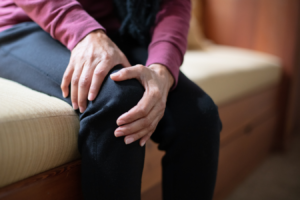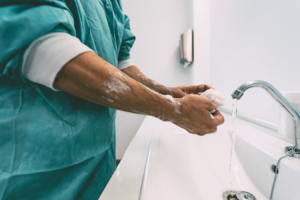 A prosthetic joint infection (PJI), also known as a periprosthetic infection, is a rare, yet serious possible complication associated with joint replacement. While a small minority of joint arthroplasties will become infected, appropriate recognition and treatment are critical to preserving and/or restoring a person’s function. Thankfully, there are ways to help reduce a patient’s risk for a PJI, as well as treat it with the help of an orthopaedic surgeon.
A prosthetic joint infection (PJI), also known as a periprosthetic infection, is a rare, yet serious possible complication associated with joint replacement. While a small minority of joint arthroplasties will become infected, appropriate recognition and treatment are critical to preserving and/or restoring a person’s function. Thankfully, there are ways to help reduce a patient’s risk for a PJI, as well as treat it with the help of an orthopaedic surgeon.
In this post, we’ll explain what happens when a prosthetic joint becomes infected, as well as how PJIs are treated and diagnosed, can be prevented, and more. Read on to learn more.
What is a prosthetic joint?
A prosthetic joint replaces a “bad” joint in the body. Simply put, when a person has ‘joint replacement’ surgery, their joint is replaced with a prosthetic joint. The prosthetic is traditionally made up of metal, hard plastic, or ceramic and is normally used to replace a deteriorated or diseased joint.
What causes prosthetic joint infections?
Prosthetic joint infections are the result of two possible scenarios. One possibility is that bacteria is introduced to a patient’s body during joint replacement surgery. Though joint replacement teams and facilities take precautions to ensure sterility during surgery, it is a rare possibility for those in the operating room to carry the bacteria and accidentally transfer the infection to the patient during surgery.
Another possible cause of a PJI is bacteria or an infection seeded from another site, such as a urinary tract infection (UTI), break in the skin, or a dental procedure. Staphylococcus bacteria – often referred to as staph – is the most common type of bacteria that causes prosthetic joint infections.
Some people are at higher risk of developing infections after joint replacement surgery. A few factors that increase this risk include:
- Immune deficiencies like HIV or lymphoma
- Diabetes
- Poor circulation to the hands and feet
- Obesity
- Smoking
- Immunosuppressive treatments such as chemotherapy or corticosteroids
 What are the symptoms of a joint replacement infection?
What are the symptoms of a joint replacement infection?
The American Academy of Orthopaedic Surgeons state that the symptoms of a prosthetic joint infection include:
- Increased pain or stiffness in a previously well-functioning joint
- Swelling
- Warmth and redness around the wound
- Wound drainage
- Fevers, chills and night sweats
- Fatigue
How are prosthetic joint infections diagnosed?
If a surgeon suspects a patient has a PJI, he/she may order laboratory tests to help identify an infection. Additionally, a doctor may take and analyze the fluid from a joint to help determine if an infection is present. Also, imaging tests such as x-rays and bone scans may be performed to help identify whether an infection exists in the implants.
How are prosthetic joint infections treated?
If a patient does in fact have a joint replacement infection, available treatment options include the following.
Nonsurgical Treatment
If the infection only exists in the skin and soft tissue around the joint and has not spread deeply into the prosthetic joint, it is called a “superficial infection”. If a superficial infection is caught early, treatment may include intravenous (IV) or oral antibiotics, which have a good success rate.
Surgical Treatment
However, if the infection goes beyond the superficial tissue, surgery is required. Often, joint replacement infections require staged surgery. During this type of surgery, the orthopaedic surgeon will remove all components of the infected artificial joint and insert a ‘spacer’. The spacer is loaded with antibiotics which mingle with the cement in the joint. Furthermore, the cement used with the spacer helps disperse the antibiotics throughout the infected joint. Typically, the spacer will stay in the joint for 6 to 12 weeks, depending on a patient’s lab results. Then, after the joint heals, the orthopaedic surgeon will perform a third and hopefully final surgery, replacing the spacer with a new artificial joint.
How can prosthetic joint infections be prevented?
 What precautions does AOS take to prevent prosthetic joint infections during surgery?
What precautions does AOS take to prevent prosthetic joint infections during surgery?
Of course, as more joint replacements are performed, the number of PJIs will also increase, as the two are directly proportional. However, at Advanced Ortho and Spine, we take every precaution to ensure the most sterile surgical conditions and positive patient outcomes. A few of these include the following. Critically, we keep the joint components sterile until they are placed into the joint. Also, we perform cyclical cleansing of the wound throughout the procedure. Additionally, anyone allowed in the operating room must wash their hands extensively and wear proper attire.
How can patients help prevent prosthetic joint infections?
Thankfully, there are steps patients can take to prevent a prosthetic joint infection before surgery. First, quit smoking. Smoking hinders your body’s ability to heal. Basically, it slows down oxygen and white blood cells in the body. In fact, studies show smokers take 1.5 – 3 times longer to heal. Therefore, if patients who smoke quit, their healing times and the possibility of infection decrease.
Additionally, those with diabetes are also in danger of a prolonged healing process or possible infections. Essentially, if a person’s sugar levels are too high it may allow infection to spread faster. Prior to surgery, an orthopedic surgeon may request a person with diabetes to undergo an A1C blood test, which shows a patient’s average blood sugar levels over the past few months. This allows the surgeon to see how responsibly the diabetic patient maintains their blood sugar levels and may determine if the surgery is a good idea or not. Furthermore, a surgeon may suggest that a diabetic patient maintain a healthier blood sugar level for a certain amount of time before revisiting joint replacement as an option.
Finally, maintaining proper oral hygiene also helps to prevent prosthetic joint infections. Why? Bacteria can enter the body through the mouth. In fact, even a procedure as simple as a teeth cleaning can cause bacteria to enter the body and cause a PJI. Therefore, orthopaedic surgeons typically request that their joint replacement patients be prescribed antibiotics if they are to undergo any type of dental work.
When should I talk to a doctor?
If you’ve had joint replacement surgery and notice any of the above symptoms, contact your doctor immediately. The quicker an infection is diagnosed and treated, the greater a patient’s chances become to heal and regain normal joint function.
We can help.
At Advanced Ortho and Spine (AOS), we have the knowledge and expertise to treat prosthetic joint infections. Dr. Christopher Cook and Dr. Lee Swiderek at AOS specialize in treating a variety of orthopaedic conditions. Request an appointment online or call us at 615.885.0200 to schedule yours today.
 Dr. Christopher Cook is a Board-Certified Orthopaedic Surgeon and Sports Medicine & Joint Replacement Specialist at Advanced Ortho and Spine. He provides a full spectrum of Joint Replacement, Sports Medicine, and Shoulder & Upper Extremity services. Contact us today for more information or to request an appointment. Contact us today for more information or to request an appointment.
Dr. Christopher Cook is a Board-Certified Orthopaedic Surgeon and Sports Medicine & Joint Replacement Specialist at Advanced Ortho and Spine. He provides a full spectrum of Joint Replacement, Sports Medicine, and Shoulder & Upper Extremity services. Contact us today for more information or to request an appointment. Contact us today for more information or to request an appointment.
 Dr. Lee Swiderek is a Fellowship-Trained Orthopedic Surgeon & Joint Replacement Specialist at Advanced Ortho and Spine. He provides a full spectrum of Joint Replacement and Complex Hip and Knee Reconstruction services. Contact us today for more information or to request an appointment.
Dr. Lee Swiderek is a Fellowship-Trained Orthopedic Surgeon & Joint Replacement Specialist at Advanced Ortho and Spine. He provides a full spectrum of Joint Replacement and Complex Hip and Knee Reconstruction services. Contact us today for more information or to request an appointment.

With two locations near Nashville in Mt. Juliet and Hermitage, Advanced Ortho and Spine provides patients with high-quality, personalized care while advancing orthopaedic excellence. Contact us today to learn more or to schedule your appointment.
Disclaimer: This blog provides general information and discussions about health and related subjects. The information and other content provided in this blog, or in any linked materials, are not intended and should not be construed as medical advice, nor is the information a substitute for professional medical expertise or treatment.If you or any other person has a medical concern, you should consult with your healthcare provider or seek other professional medical treatment. Never disregard professional medical advice or delay in seeking it because of something read on this blog or in any linked materials. If you think you may have a medical emergency, call your doctor or emergency services immediately.
The opinions and views expressed on this blog and website have no relation to those of any academic, hospital, health practice, or other institution.